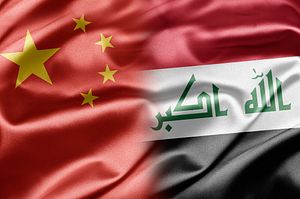In recent days there has been a lot of attention given to the potential role China could play in suppressing the Islamic State of Iraq and al-Sham (ISIS) in Iraq. The Diplomat has not shied away from this, featuring a diverse array of articles on China and ISIS.
Much of this interest has been spurred by the Obama administration announcing that it has requested China’s help in fighting ISIS in Iraq. Even among the Chinese analysts supportive of Beijing playing a direct role in the war on ISIS, many have suggested that China should do it at least in part to earn goodwill from the United States.
This is preposterous. Not only does ISIS pose a greater threat to China and Chinese interests, but Beijing has had a large role in ISIS’s rise as well.
As I’ve noted before, ISIS did not directly threaten the United States before America began conducting airstrikes against it last month. The same cannot be said of ISIS’s stance toward China. For instance, in a speech he made back in July, ISIS leader Abu Bakr Al-Baghdadi noted to his followers that “Muslim rights are forcibly seized in China, India, Palestine” and elsewhere around the world. A five-year expansion map released at the same time showed ISIS’s aspirations to swallow up Xinjiang province.
Then, after returning from a trip to the region later that same month, Wu Sike — then China’s Middle East envoy — revealed that at least 100 Chinese citizens were training with ISIS in the Middle East. He said most were members of Uyghur separatist groups who have stepped up their own terrorist attacks against the Chinese state over the past year. “After being immersed in extremist ideas, when they return to their home country they will pose a severe challenge and security risk to those countries,” Wu said at the time.
The past week has seemed to offer confirmation of this, as the Iraqi Ministry of Defense announced the capture of a Chinese national fighting with ISIS. This is a serious threat to China given that, largely unlike the United States, China actually experiences frequent terrorist attacks from its disenfranchised Muslim population.
Besides the security threat ISIS poses to China, the group also threatens Beijing’s energy security. It’s no secret that while the U.S. fought the Iraq War, it was China and Iran who won it. Since the 2003 U.S. invasion, Chinese energy companies have invested some $10 billion in Iraq’s nascent oil industry. In recent years, China has been the destination for around half of Iraq’s oil exports. This is not insignificant from China’s perspective either. China’s oil imports from Iraq have doubled since 2011 and grew by 50 percent in 2013 alone, the largest growth of any country last year. This made Iraq China’s fifth largest oil supplier after Russia, with Iraqi oil accounting for roughly 10 percent of China’s imports (the U.S. imports far less of its oil and only 4 percent of its imports came from Iraq last year). Moreover, China is the largest importer of Middle Eastern crude, with over 50 percent of its imports coming from the region last year.
Although China clearly has more at stake in countering ISIS, some may charge that the U.S. and its allies should bear the full burden since they helped fuel ISIS’s rise by invading Iraq in 2003. These same observers might also rightly point out that China opposed this invasion.
You won’t find an argument with me about this. I’ve already written that the U.S. did more than any other outside power to fuel ISIS’s rise. This point seems indisputable to me.
That being said, China is also directly culpable for ISIS’s rise. Although America’s 2003 invasion directly contributed to the creation of al-Qaeda in Iraq (AQI) — the predecessor of ISIS — the group was largely a spent force after the U.S. surge and the Anbar Awakening. Even after it refashioned itself as the Islamic State of Iraq, the group remained a marginal force at best.
It was the Syrian civil war that fueled ISIS’s revival. The sectarian nature of the Assad regime and its brutal crackdown, which played into ISIS’s own strategy, was what helped the group revive itself. That war, as well as the Nouri al-Maliki government’s sectarian nature, gave ISIS the chance to rise from the ashes of history.
Of course, it was China who joined Russia and Iran in propping up the Assad regime over America’s strident objections. That policy has now backfired, as China itself has implicitly admitted. Had China, Russia, and Iran listened to the U.S. and not continued to back Assad, it’s unlikely his regime could’ve stayed in power. And without the outside threat presented by the Alawites and Shia, Syrian and Iraqi Sunnis would’ve never gotten behind ISIS.
If anything, then, it is China who should be appreciative of any role the United States plays in fighting the jihadist group, not the other way around.
































